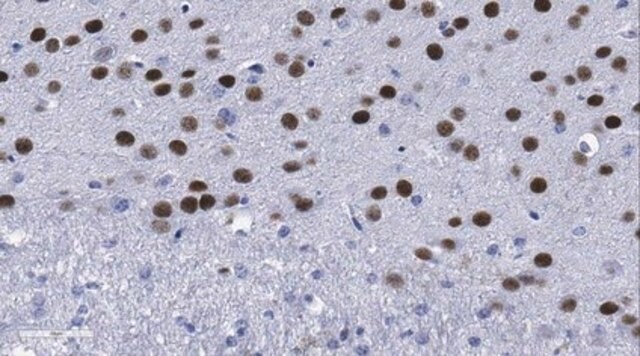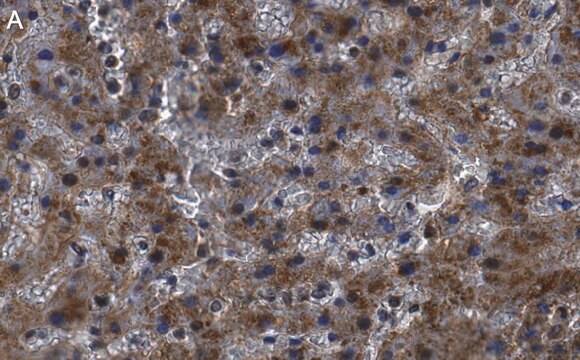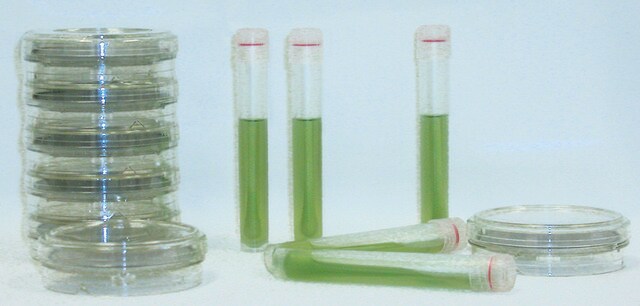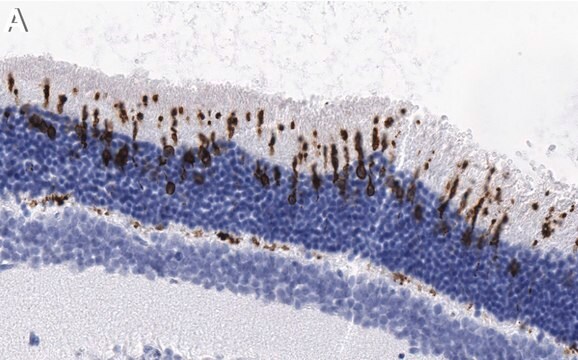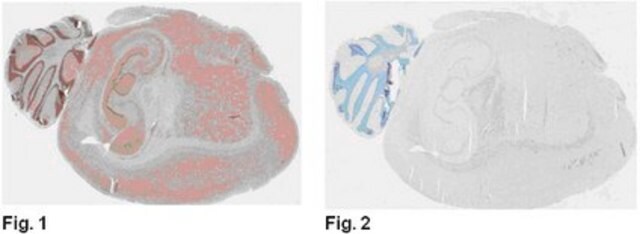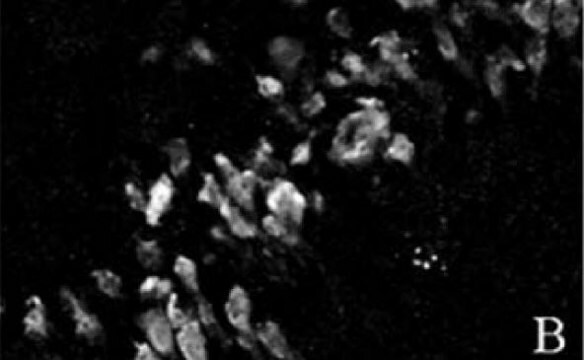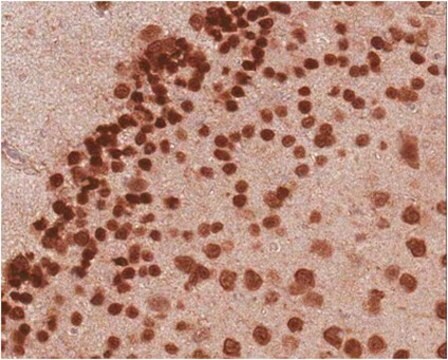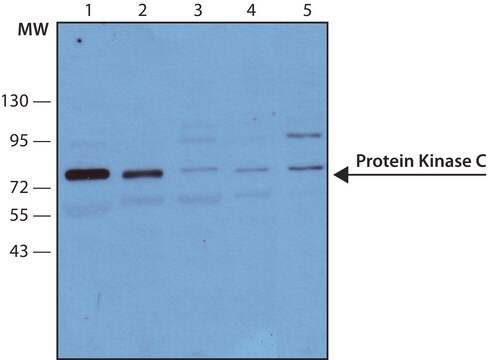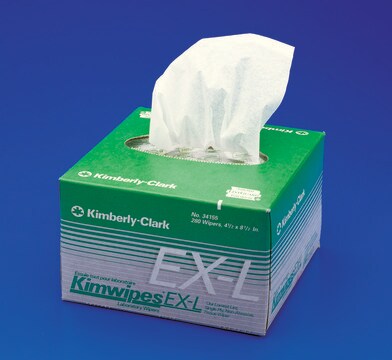General description
We are committed to bringing you greener alternative products, which adhere to one or more of The 12 Principles of Green Chemistry.This antibody is Preservative-free, produced without the harm or sacrifice of animals and exceptionally stable to allow for ambient shipping and storage if needed and thus aligns with "Waste Prevention", "Designing Safer Chemicals" and "Design for Energy Efficiency".
Click here for more information.
ZooMAb® antibodies represent an entirely new generation of recombinant monoclonal antibodies.Each ZooMAb® antibody is manufactured using our proprietary recombinant expression system, purified to homogeneity, and precisely dispensed to produce robust and highly reproducible lot-to-lot consistency. Only top-performing clones are released for use by researchers. Each antibody is validated for high specificity and affinity across multiple applications, including its most commonly used application. ZooMAb® antibodies are reliably available and ready to ship when you need them.
Specificity
Clone 2H22 is a Rabbit recombinant monoclonal antibody that specifically detects Protein kinase Ca. It targets an epitope within 15 amino acids from the C2 domain in the N-terminal half.
Immunogen
KLH-conjugated linear peptide corresponding to 15 amino acids from the N-terminal half, C2 domain of human Protein Kinase Ca.
Application
Quality Control Testing
Evaluated by Western Blotting in U2OS cell lysate.
Western Blotting Analysis: A 1:1,000 dilution of this antibody detected PKCa in U2OS cell lysate.
Tested applications
Western Blotting Analysis: A 1:1,000 dilution from a representative lot detected PKCa in MCF-7 and HeLa cell lysates.
Immunofluorescence Analysis: A 1:100 dilution from a representative lot detected PKC in human cerebral cortex tissue sections.
Immunohistochemistry (Paraffin) Analysis: A 1:100 dilution from a representative lot detected PKC in human cerebral cortex tissue sections.
Note: Actual optimal working dilutions must be determined by end user as specimens, and experimental conditions may vary with the end user
Target description
Protein kinase C alpha type (UniProt: P17252; also known as EC:2.7.11.13, PKC-A, PKC-alpha) is encoded by the PRKCA (also known as PRKACA) gene (Gene ID: 5578) in human. Protein kinase C, a ubiquitous, phospholipid dependent serine/threonine kinase, is involved in signal transduction associated with cell proliferation, differentiation, and apoptosis. At least eleven closely related PKC isozymes have been reported that differ in their structure, biochemical properties, tissue distribution, subcellular localization, and substrate specificity. PKCa is a conventional, Ca2+-activated, diacylglyceral (DAG)-dependent PKC isozyme. Its protein kinase domain is localized in amino acids 339-597 and also has an AGC-kinase C-terminal that is localized in amino acids 598-668. The Ca2+-binding site of PKCa resides in the regulatory domain that contains two conserved regions, C1 and C2, that play a vital role in the regulation of enzyme activity. The C2 domain (aa 158-275) serves as calcium sensor. The catalytic domain is composed on highly conserved C3 and C4 regions. The C3 region contains the ATP-binding consensus sequence, whereas the C4 region is responsible for protein substrate binding. PKCa is highly expressed in a number of cancer cells where it can act as a tumor promoter and is implicated in malignant phenotypes of several tumors such as gliomas and breast cancers. It can positively regulate angiogenesis, platelet aggregation, and thrombus formation in arteries. On the other hand, it negatively regulates myocardial contractility and regulates cardiomyocyte function by phosphorylating cardiac troponin T, which induces significant reduction in actomyosin ATPase activity, myofilament calcium sensitivity and myocardial contractility. It also promote cell growth by phosphorylating and activating RAF1, which mediates the activation of the MAPK/ERK signaling cascade, and by up-regulating cyclin dependent kinase inhibitor 1A (CDKN1A), which facilitates active cyclin-dependent kinase (CDK) complex formation in glioma cells. This ZooMAb® recombinant monoclonal antibody, generated by our propriety technology, offers significantly enhanced specificity, affinity, reproducibility, and stability over conventional monoclonals.
Physical form
Purified recombinant rabbit monoclonal antibody IgG, lyophilized in PBS, 5% Trehalose, normal appearance a coarse or translucent resin. The PBS/trehalose components in the ZooMAb formulation can have the appearance of a semi-solid (bead like gel) after lyophilization. This is a normal phenomenon. Please follow the recommended reconstitution procedure in the data sheet to dissolve the semi-solid, bead-like, gel-appearing material. The resulting antibody solution is completely stable and functional as proven by full functional testing. Contains no biocide or preservatives, such as azide, or any animal by-products. Larger pack sizes provided as multiples of 25 μL.
Reconstitution
300 μg/mL after reconstitution at 25 μL per vial. Please refer to guidance on suggested starting dilutions and/or titers per application and sample type.
Storage and Stability
Recommend storage of lyophilized product at 2-8°C; Before reconstitution, micro-centrifuge vials briefly to spin down material to bottom of the vial; Reconstitute each vial by adding 25 μL of filtered lab grade water or PBS; Reconstituted antibodies can be stored at 2-8°C, or -20°C for long term storage. Avoid repeated freeze-thaws.
Legal Information
ZooMAb is a registered trademark of Merck KGaA, Darmstadt, Germany
Disclaimer
Unless otherwise stated in our catalog or other company documentation accompanying the product(s), our products are intended for research use only and are not to be used for any other purpose, which includes but is not limited to, unauthorized commercial uses, in vitro diagnostic uses, ex vivo or in vivo therapeutic uses or any type of consumption or application to humans or animals.


